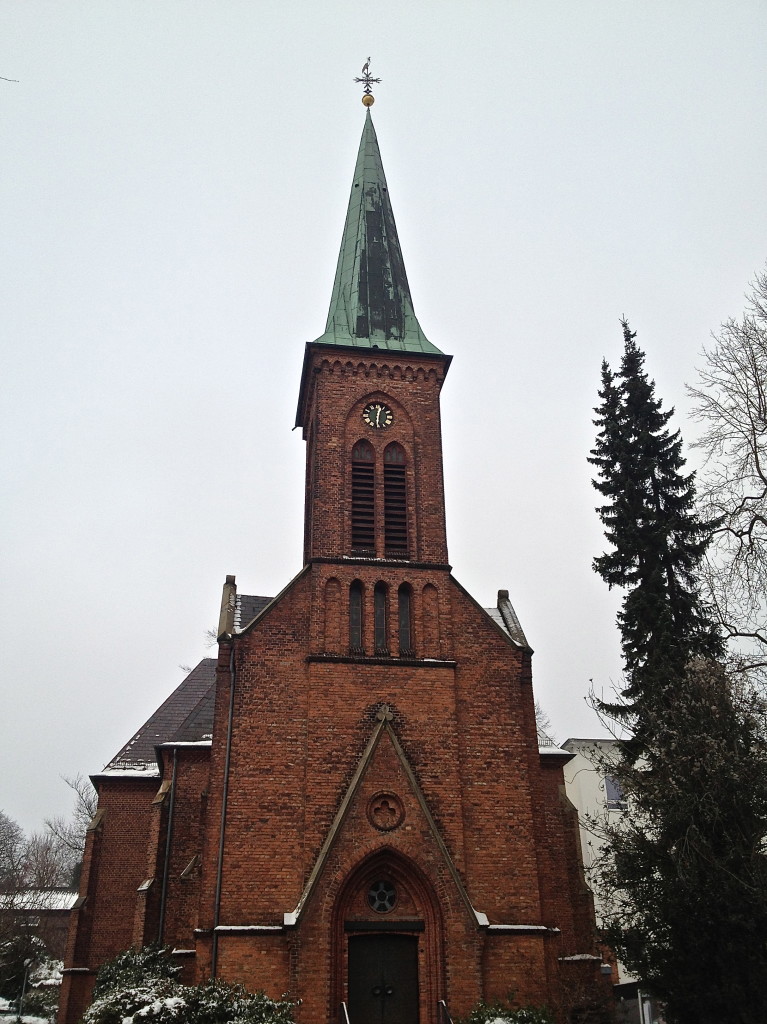 The sun was quickly disappearing behind the layers of clay tile roof – dusk was settling in way too soon for my liking. I parked my rental car on the cobblestone street and walked briskly toward the red brick chapel with the weather-worn copper steeple. The frosty winter’s air was heavy with silence.
The sun was quickly disappearing behind the layers of clay tile roof – dusk was settling in way too soon for my liking. I parked my rental car on the cobblestone street and walked briskly toward the red brick chapel with the weather-worn copper steeple. The frosty winter’s air was heavy with silence.
Chances were the outer doors would be locked, but when I pulled on the handle, the entrance cracked open revealing a small foyer. Feeling rather fortunate, I slipped inside. The second set of doors were much older, heavier and crafted of solid wood. Their patina spoke of centuries of wear. These ancient doors seemed to challenge me as if to say, “Go ahead, see if you’re brave enough … open Us.” I tugged the handle just to see if it would budge. Sure enough, a sliver of openness emerged between the doors and a woman’s song rippled out on sound waves to meet me. All that brick, stone and wood had contained her voice until the moment I’d broken the seal. Tentative, I let the door go. I had no business creeping into a church I’d never been to before. What if I was caught? How would I explain myself when I couldn’t even speak the native language? The door slid shut with a quiet thump returning to it’s original position, once again containing the song on the inside, me on the outside.
In the end, any potential consequences were not enough to sway my curiosity. I took a deep breath and considered my options. I was only here for a short time and if I didn’t go in now, I might miss my chance. Once more I pulled the handle and, this time, I slipped inside, unseen.
There was a shadow shrouding the sacred space like a fine mist. That same voice continued, much louder now that I was inside the church. It permeated the sanctuary and, like a flood, it washed over me, overtaking me. The song, the voice – the music was everywhere at once, bouncing off the stone and wood facades, and yet without the cacophony that echoes sometimes develop. The sound was clear. Perfect.
Her contralto voice was rich and full as she sang what sounded to me, like opera. The notes equally as beautiful as they were haunting. Certainly there was a physical body to go along with the ghostly voice, but she was nowhere to be seen.
I tucked into a pew and absorbed my surroundings or at least what I could in the dim light. Above me, the ceiling reached way up past baroque style columns that curved and stretched from the top all the way down to the stone floor. A single chandelier was suspended in the centre – a simple and uncomplicated design that appeared more modern that it’s surroundings. The pews carried on in front of me in rows, about a dozen or so. It wasn’t a large church. I noticed there must be two wings at the front, on either side of the altar. A solitary beam of sunlight pierced the stained glass windows behind the altar, particles of dust bouncing around in it’s path.
Taken altogether, the church was a mass of stone, concrete, wood and glass. A cold place, if not for the warm contralto voice which continued it’s grip, fixing me in it’s trance.
Questions swirled in my head. Where was the beautiful voice coming from? I looked everywhere and saw no evidence of a person. Am I trespassing?
The awe-inspiring nature of this scene wasn’t lost on me. I decided, regardless of my questions, I would document the moment. I pointed the lens of my phone to the light at the front, capturing the windows, the sunbeam, the altar. I snapped the pews and all of the details around me including the gold painted accents on the columns. I wanted to remember it all. This scene of me in this wondrous church with this incredible invisible singer was something I imagined sharing with my friends and my husband when I returned home.
I had just flown in from Hamburg the night before and had hardly been in this little town for 24 hours. I was sleep deprived from an exhausting trip that should have taken 12 hours at most, but somehow became nearly 40 hours, door to door. Still, I was elated to be here in this town that my mother perpetually told me stories about. The town where she spent three years of her childhood, from age eight to eleven, where she was layered with enough experiences to last her a lifetime. This was the town where my mother was orphaned and her mother (my grandmother) was buried.
I had spent the afternoon of my first day in Eutin traipsing through the snow-covered cemetery desperately trying to find the location of my grandmother’s bones. As far as I could tell, nothing remained but an unmarked grave in an unknown location. The stone my mother installed had, by now, disappeared.
I was devastated.
In some unrealistic sense, if I were to actually “think” about it, my expectations for this visit were way off. Sitting in that church pew, an overwhelming feeling of disappointment and loneliness took hold. The melancholy notes of the invisible singer perfectly echoed my emotional sentiments. I was beginning to accept the cold facts. I would never meet my grandmother, my Oma. She was gone. My mother, even though I so badly wanted to find her here … well, she was gone too. Both had been gone a seriously long time. Sometimes the simplest of ideas are the hardest to grasp. I was alone here in Eutin.
Now, in that pew, I was beginning to comprehend the vast difference between my expectations and reality. It was disheartening. Still, I missed my Oma (who I had never met) so intensely that I felt an ache in my heart. It didn’t make any sense to miss someone I never even knew.
The contralto voice, still unseen, broke into my thoughts bringing me back to my senses, to the here and now. Her singing truly was a gift. I imagined her voice as though it was a series of waves crashing onto a shore, permeating the space I was in, echoing, expanding, bouncing and retreating.
It became a conscious effort to move myself from unreality to reality. To become a part of the present moment rather than merely an observer, disconnected from the experience I was in. Perhaps my exhaustion and loneliness helped as I attempted to let my guard down and allow the notes to affect me. I held onto my vision of the singer’s voice – as though her notes were waves crashing, rushing toward me, bouncing off my skin, filling my eardrums, sinuses and my head. I envisioned the sound affecting me, becoming a part of my being. I became “open” and allowed it to be so.
The tears were falling for some time before I noticed, the dark wet circles expanding on my lap. I was lonely, tired, disappointed and broken. I was raw and spent. Vulnerable. Cracked open and helpless.
In that moment, everything changed.
That’s when I heard my Oma, her contralto voice singing melancholy songs into the inky darkness of an open-box car. The two of them, mother and child, riding the rails. Escaping tanks. Bombs lighting up the night sky behind them. Her voice a comfort. A salve.
It wasn’t her voice, but it was her voice. That’s what my ears heard, what my heart heard. As much as it didn’t make sense, it did. A sacredness settled over me as I continued to allow the music, that beautiful voice, to move me, heal me, soothe me.
It would seem, after all, I had met my Oma here. Not in the way I imagined or hoped for. Not in person. But I felt her spirit, her energy, her voice. Another gift.
I slipped out of the church the same way I had come in. Unseen. My heart, previously broken and depleted, was now filled to overflowing with gratefulness.
There’s something about this town, Eutin.
There’s something about the energy here. There’s a sound. An echo that still rings out with the voices of the people I love and miss so dearly. I want to hear them. I want to listen. I promise to be open.
I promise to come back soon.

Ruth Janzen
Thinking of you and remembering those who have gone before…
Jennifer
Thanks Ruth.